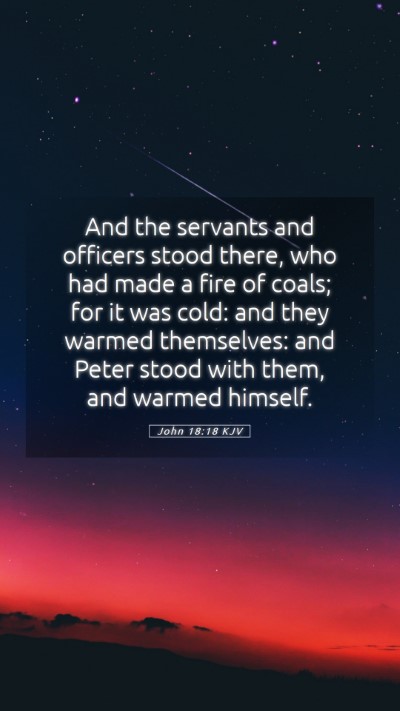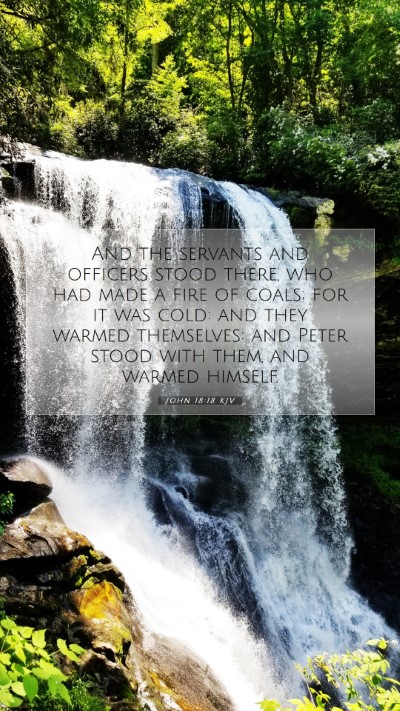Bible Verse Meaning and Interpretation of John 18:18
John 18:18 states:
"And the servants and officers stood there, who had made a fire of coals; for it was cold: and they warmed themselves: and Peter stood with them, and warmed himself."
Overview
This verse captures the moment after Jesus' arrest, detailing Peter's actions and the environment around him. Understanding this passage involves examining Peter's character amidst the sorrow of Christ’s impending crucifixion.
Key Themes and Insights
- Setting and Atmosphere: The coldness of the night symbolizes the spiritual coldness surrounding Peter as he stands among those who oppose Jesus.
- Peters' Compromise: Peter’s choice to warm himself with the enemies of Christ reflects his internal struggle and fear of association. It shows the tension between faith and fear.
- Community and Exclusion: The gathering of officers and servants indicates a community formed out of mutual opposition to Jesus, contrasting with the disciples' loyal fellowship.
Bible Verse Commentary
This commentary draws from historical and contextual analysis based on public domain sources including Matthew Henry, Albert Barnes, and Adam Clarke.
Matthew Henry's Commentary
Henry notes that this scene illustrates a pivotal moment for Peter, who moves from being Christ's fervent follower to a position where he feels the coldness of his faith. The fire created by Christ’s enemies serves as a stark reminder of Peter’s forthcoming denial.
Albert Barnes' Commentary
Barnes emphasizes the contrast between the warmth of the fire and the spiritual chill that Peter experiences. He outlines this setting as one of trial, highlighting the dangers of being in the company of those who oppose Christ and the temptation to conform.
Adam Clarke's Commentary
Clarke identifies the assembly around the fire as pivotal in providing a lens through which to view the moral dynamics of the situation. Peter’s choice to remain with the servants serves as a profound illustration of the consequences of situational allegiance, challenging readers to consider their own choices in the face of faith and fear.
Understanding the Context
This verse falls within the broader narrative of Jesus’ trial and crucifixion, where the events preceding and following it form a critical backdrop for analysis. Understanding the cultural and historical context enhances Bible verse interpretations:
- Consider why Peter is in the company of the servants.
- Reflect on the emotional and spiritual ramifications of Jesus’ arrest on His followers.
- Recognize the significance of fire in biblical literature as both a source of comfort and a tool for danger.
Cross References
- Luke 22:54-62 - Discusses Peter's denial of Christ.
- Matthew 26:69-75 - Another account of Peter's denial.
- Mark 14:66-72 - Details Peter's experience at the fire.
Application and Reflection
This passage holds powerful implications for modern believers:
- Faith vs. Fear: Reflect on personal moments of standing firm in faith despite external pressures.
- Choosing Company: Consider the influences in one’s life and the impact of associating with those who do not share one’s beliefs.
- Importance of Community: Engage in supportive communities like Bible study groups to foster encouragement in faith.
Conclusion
John 18:18 invites believers to examine the complexities of faith, fear, and the social dynamics of belief. Understanding this verse requires diligent study and reflection on Peter's choices and the environment he found himself in.
Bible Study Insights
Utilizing tools for Bible study, such as commentaries, can aid in grasping the significance of scripture. Interpretation and analysis through the lens of reliable sources provide a fuller understanding of challenging passages.


